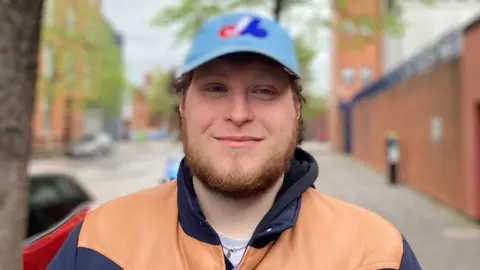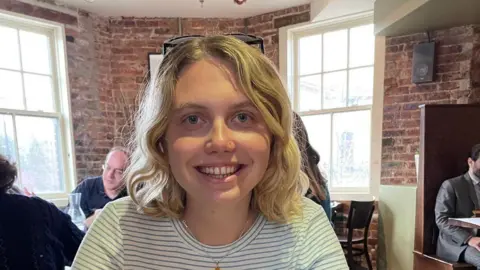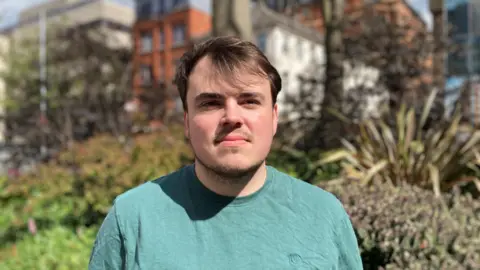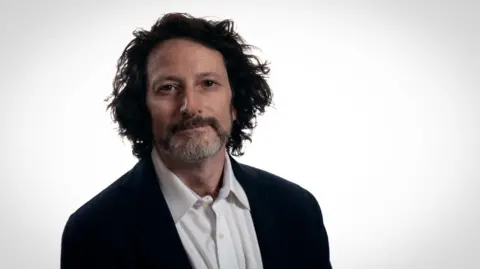I wanted to study in the US - now I'm too scared I'll get deported
 BBC
BBCLike thousands of students from across the island of Ireland who head across the Atlantic every year, Callum O'Reilly had considered studying in the United States - but not any more.
Hundreds of foreign students have had their international student visas revoked in recent months, with many of those targeted having taken part in some form of pro-Palestinian activity.
President Donald Trump, who issued an executive order in January promising to combat antisemitism, described the arrest of a Palestinian activist last month as the first "of many to come".
J1 visas are traditionally a a rite of passage for students on both sides of the Irish border - but for Mr O'Reilly, a Queen's University Belfast student, the idea of being detained while in the United States is "terrifying".
"It's a very scary thing, especially as a student of history," he said, adding that he is considering other options for studying abroad.
Mr O'Reilly said he had been "politically active, focusing on reproductive rights".
"That is something that is under fire in the [United] States."
He added that having "pro-Palestine" beliefs have added to his worries about studying in the US.
Mr O'Reilly said that he expects that he won't be the only student rethinking their plans.
"When young people see what's going on, you're put off by how things are going."
What is happening to foreign students in the US?
On Tuesday, the Union of Students in Ireland (USI) issued advice warning students to be cautious about "activism" while on the annual J1 visa programme this summer.
Thousands of Irish students participate in the visa programme each year.
The USI said that activism includes participating in peaceful protests or demonstrations, sharing opinions and information on social media platforms, joining or forming advocacy groups, and, displaying symbols or messages.
US Secretary of State Marco Rubio said that student visas are for studying and warned they would be revoked if they were seen as engaging in "destabilizing" acts.
The Trump administration has said repeatedly that visas are a "privilege" and can be revoked at any time for a wide variety of reasons.
However, figures from Inside Higher Ed, an online news site, suggests more than 1,000 international students or recent graduates have had their visas revoked or legal statuses changed.
How do students feel about what's happening in the US
 Chris Pollard
Chris PollardFor Emily Polland, a Queen's student currently in Washington DC on a J1 visa, the atmosphere has "changed" since President Trump's inauguration.
"Me and my friends talk about the crackdown; you see in the media about people not being let in."
Ms Pollard said heightened activity by US immigration officials meant she feels less comfortable leaving the US in case she has difficulties re-entering.
"I think it would make me think again, I think I would definitely be more worried if I was coming in the future".

Cathal McStay said he has started to "see the downsides" to studying in the US, but said he may consider it "if things were to change".
He said that academics in the US are afraid and it is "very clear that there's now a brain drain occurring in the United States", with the executive order playing a "large" role in both these factors.
Mr McStay added that the US has "damaged its reputation in the academic field".
'Significant departure from the norm'
 David Tau
David TauSteven Heller, an immigration lawyer based in New York, said the current treatment of students on J1 visas is a "significant departure from the norm".
"I think 1,300 student visas have been revoked. The vast majority of those have been revoked because of encounters with US law enforcement, which includes arrests without charge," he said.
"It also includes victims of crimes who have encountered US law enforcement."
He described the current situation in the United States as "big brother-ish".
Mr Heller said many of those singled out by law enforcement face scrutiny due to activism related to the conflict in the Middle East.
"People who have been critical of the Israeli response to the Hamas attacks have been targeted," he told BBC News NI.
Mr Heller said he would "caution" students on J1 visas to be careful about what they post on social media.
Pro-Palestinian protests have been at the centre of the dispute between Trump's administration and several American universities.
On Monday, Harvard University said it would not acquiesce to US President Donald Trump's demands, which included making changes to its admissions practices that the US government said were key to fighting antisemitism on campus.
In response, President Trump threatened to freeze more than $2bn (£1.5bn) in federal funds for Harvard and ban foreign students from enrolling at the university.
